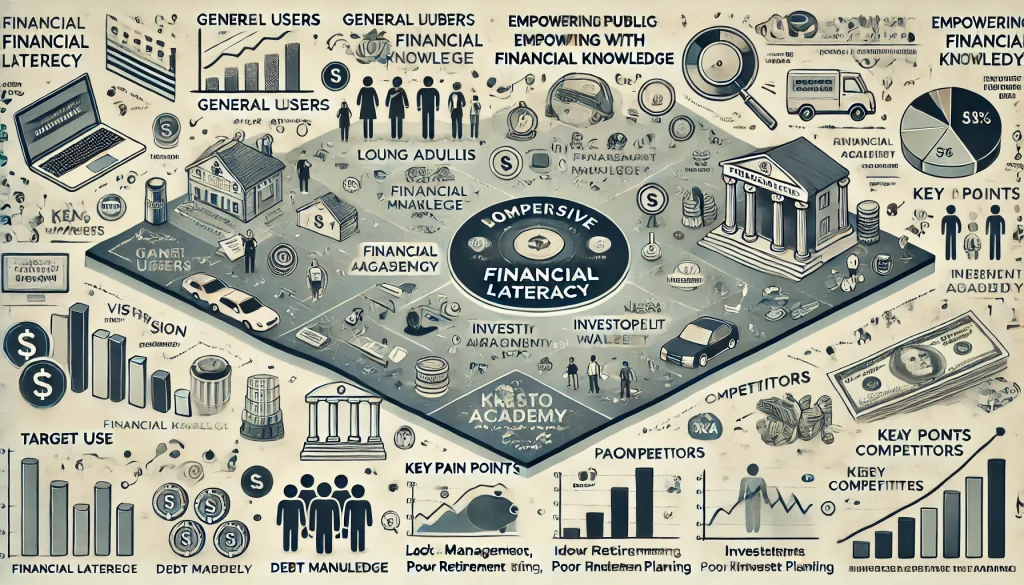Problem Statement:
In today’s complex financial landscape, many individuals lack essential financial literacy skills. This deficiency hampers their ability to make informed decisions about crucial aspects like savings, investments, and debt management. The lack of understanding often results in poor financial outcomes, such as high levels of debt, inadequate retirement savings, and suboptimal investment choices. This issue is particularly pressing among young adults, low-income families, and retirees, who are most vulnerable to financial mismanagement. Addressing this gap through an educational platform can significantly improve personal financial stability and overall economic health.
Pain Points:
- Lack of Basic Financial Knowledge: Difficulty understanding basic financial concepts such as interest rates, inflation, and budgeting.
- Debt Management Issues: Struggles with managing and reducing debt, especially credit card and student loan debt.
- Inadequate Retirement Planning: Insufficient knowledge about retirement savings options and strategies.
- Poor Investment Understanding: Lack of understanding about investment opportunities, risks, and portfolio management.
- Budgeting Challenges: Difficulty in creating and adhering to personal or family budgets.
- Confusion About Financial Products: Misunderstandings regarding different financial products like mortgages, loans, and insurance.
- Goal Setting Difficulties: Challenges in setting and achieving short-term and long-term financial goals.
- Lack of Savings: Insufficient emergency funds and savings for future needs.
- Complex Tax Laws: Difficulty understanding tax obligations and benefits.
- Limited Access to Financial Advice: Lack of affordable and personalized financial guidance.

Future Vision:
The envisioned platform aims to become a leading resource for financial education, offering accessible, comprehensive, and user-friendly tools and content. It will cover a broad spectrum of financial topics, from basic budgeting to advanced investment strategies. The platform will feature interactive courses, webinars, articles, and calculators, tailored to various user segments such as students, working professionals, and retirees. By leveraging data analytics, the platform will provide personalized recommendations and track user progress. The ultimate goal is to empower individuals with the knowledge and confidence to make informed financial decisions, leading to improved financial well-being and stability.
Use Cases:
- Basic Financial Education for Students: Offering courses on budgeting, saving, and the basics of credit.
- Debt Management Tools: Providing calculators and strategies for reducing debt.
- Investment Literacy Programs: Educational content on stocks, bonds, mutual funds, and retirement accounts.
- Personalized Financial Planning: Tools for setting and tracking financial goals.
- Retirement Planning: Guides and resources for planning for retirement.
- Budgeting Assistance: Interactive budgeting tools and tutorials.
- Understanding Financial Products: Informational guides on different financial products and services.
- Tax Education: Resources for understanding tax obligations and filing.
- Workshops and Webinars: Live sessions with financial experts.
- Community and Support Forums: A space for users to ask questions and share experiences.
Target Users and Stakeholders:
- Target Users: General public, young adults, low-income families, elderly, students.
- Age Group: 18-65+
- Gender: All genders
- Usage Pattern: Varies from casual browsing to intensive course participation.
- Benefit: Improved financial literacy, better decision-making, reduced debt, and enhanced savings.
- Stakeholders:
- Users: Individuals seeking financial education.
- Financial Institutions: Banks, credit unions.
- Educational Institutions: Schools and colleges.
- Government Agencies: Promoting financial literacy.
- Non-Profit Organizations: Supporting underserved communities.

Key Competition:
- Competitors: Financial education platforms like Khan Academy, Investopedia, NerdWallet, and educational initiatives by banks such as Wells Fargo and Bank of America.
Products/Services:
- Khan Academy: Offers free courses on economics and personal finance.
- Investopedia: Provides a wide range of financial education resources, including articles, tutorials, and quizzes.
- NerdWallet: Focuses on personal finance advice and tools for managing finances.
- Bank of America and Wells Fargo: Offer educational content and tools to help customers understand financial concepts.
Active Startups:
- Edmit: Focuses on financial planning for college students.
- Finch: An app that combines checking and investing in one account.
- Savology: Provides free personal financial planning tools.
- NextGenVest: Offers financial advice specifically for students.
- Brightside: Offers financial wellness benefits for employees.
- Penny: A personal finance assistant app.
- Edukate: Financial wellness platform for employees.
- HoneyBee: Offers financial help and education for employees.
- LearnLux: Provides digital financial education tools.
- Zogo: Gamifies financial literacy education for younger audiences.
Ongoing Work in Related Areas:
- Increasing integration of AI for personalized financial advice.
- Development of gamified financial education apps.
- Expansion of online courses and resources for financial literacy.
- Collaboration between financial institutions and educational platforms.
Recent Investment:
- Edmit: Raised $2.3 million in seed funding in 2020.
- Finch: Secured $3 million in funding in 2021.
- Savology: Raised $1.5 million in seed funding in 2021.
- NextGenVest: Acquired by CommonBond in 2019 for an undisclosed amount.
Market Maturity:
The market for financial literacy and education platforms is growing, driven by increased awareness of financial literacy’s importance. While there are several established players, there is still room for innovation, particularly in personalized learning and digital tools.
Summary:
Financial literacy is a critical skill that many individuals lack, leading to poor financial decisions and outcomes. The proposed platform aims to address this gap by providing comprehensive, accessible financial education resources tailored to various demographics, including students, young adults, low-income families, and retirees. The platform will offer a wide range of educational materials, including courses, webinars, articles, and interactive tools, to cover topics like budgeting, saving, investing, and debt management. It will leverage data analytics to provide personalized recommendations and track user progress. By improving financial literacy, the platform will empower users to make informed financial decisions, ultimately leading to better financial stability and well-being. The platform will compete with existing players like Khan Academy, Investopedia, and NerdWallet, while also differentiating itself through personalized and interactive learning experiences. The market for financial literacy is maturing, with ongoing innovations and significant investment in related startups.

